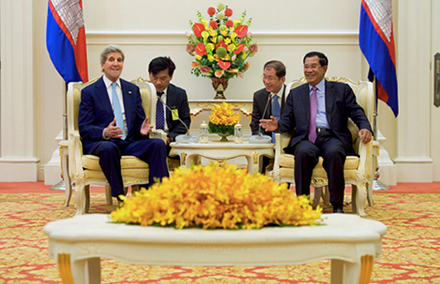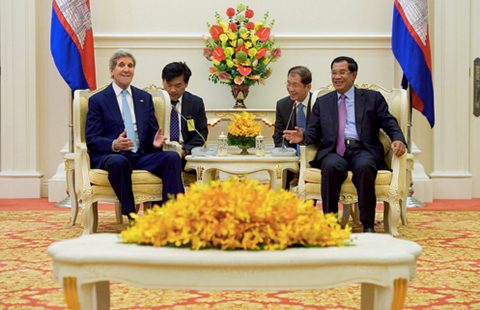
US Secretary of State John Kerry meets with Cambodia Prime Minister Hun Sen. Photo: US Embassy Phnom Penh on Flickr.
US-ASEAN Summit sends bad signal for rights across the region, writes Caitlin McCaffrie.
Much is being made of the upcoming US-ASEAN Summit that will take place on 15 and 16 February. While such meetings have been held annually since 2013, this will be the first time all 10 ASEAN leaders will meet with Barack Obama on US soil, and is widely seen as reaffirming Washington’s shifting regional focus.
The US has been redirecting its corporate and military focus towards the Asia-Pacific since it announced it’s ‘pivot to Asia’ in 2011. ASEAN is the US’s fourth largest trading partner and maintaining good ties with the region is critical to counter the ascendant economic and political influence of China.
ASEAN is a strange beast. In many ways it represents not so much a coming together of like-minded states but an alliance of necessity formed to counterbalance the larger regional powers of China and India. The launch of the ASEAN Economic Community on 1 January was a step toward greater economic integration, however politically speaking the region remains stubbornly divided.
Most recently this division was evident in the group’s response to North Korea’s internationally condemned nuclear test. In its position as 2016 ASEAN Chair, Lao PDR chose to adopt a relatively mild position on the issue, despite push back from Vietnam and Thailand who wanted the statement to be stronger.
North Korea may be on the agenda in Sunnylands, but two other topics that are certain to come up, and could prove just as divisive, are China’s actions in the South China Sea (SCS), and the freshly signed Trans-Pacific Partnership (TPP). The SCS dispute directly affects four ASEAN members: Brunei, Malaysia, the Philippines and Vietnam, and has pushed them into direct disagreement with China. The issue is now before the Permanent Court of Arbitration at The Hague, however China has already declared it does not accept the court’s jurisdiction. Regardless, it is important that ASEAN presents a united front on the issue, and it will likely be one that is in agreement with US interests.
The other issue, the TPP, has been touted as the ‘primary economic dimension’ of America’s rebalance to Asia. The partnership of 12 countries, seven years in the making, includes only four ASEAN members; Brunei, Malaysia, Singapore and Vietnam. It is likely that the US will use the meeting to encourage future membership; solidifying an economic relationship that excludes China.
Unfortunately, one issue that is likely to be conspicuously absent during the Summit is the plethora of human rights abuses committed by ASEAN leaders. Eight of the 10 ASEAN nations, with the exception of Indonesia and the Philippines, will be represented in Sunnylands by either unelected, or controversially-elected heads of state. By inviting them onto US soil, President Obama will legitimise and validate their restrictive regimes.
Indeed the Sunnylands Summit will feature a veritable who’s who of Asia’s longest-serving dictators and autocrats. Among the guests will be Cambodian Prime Minister Hun Sen, who this year celebrates his 31st year in power as his political opponent, Sam Rainsy, continues to live in self-imposed exile. The Summit marks the Prime Minister’s first official invitation to the US and will present him with an excellent opportunity to claim international credibility ahead of the 2018 elections.
Others expected to attend include Thailand Prime Minister Prayuth Chan-ocha who will represent his nation after taking over the democratically elected government in 2014’s coup. Prayuth’s invitation has been heavily criticised by human rights organisations as the Prime Minister has overseen a dramatic rise in convictions for violating lèse-majesté laws, and holds medieval views on the role of women.
Also likely to be present is recently re-elected General Secretary of the Vietnamese Communist Party, Nguyen Phu Trong, a party hardliner, and Sultan of Brunei, Hassal Bolkiah, who last year announced he would introduce sharia law to his wealthy sultanate. Interestingly, the timing of this summit means that President Thein Sein will still be the representative of Myanmar, as Aung San Suu Kyi and her National League for Democracy will not take the leadership reigns until late March.
In a year where rising censorship and political suppression is already characterising the region, this Summit is an opportunity to demand accountability. However, as the US vies with China for influence in the region, raising human rights issues puts them at a disadvantage.
China’s policy of apolitical aid and trade agreements allows them to easily and openly conduct business with some of the more corrupt regimes on the planet. To compete, the US cannot be too critical of its partners’ own records. Thus, far from being a catalyst for reform, the Sunnylands Summit will more likely to be used by many ASEAN leaders to claim international recognition of their restrictive regimes.
Caitlin McCaffrie has an interest in Southeast Asian regional politics and is currently based in Phnom Penh, Cambodia where she works on fair trial rights and justice issues.
 Facebook
Facebook  Twitter
Twitter  Soundcloud
Soundcloud  Youtube
Youtube  Rss
Rss 